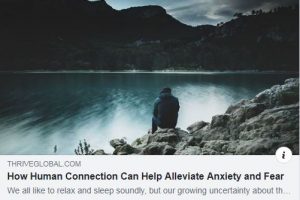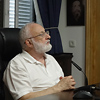We all like to relax and sleep soundly, but our growing uncertainty about the future makes us anxious and concerned. The best way to rise above these feelings is to switch from self-concern to being concerned for others.
Anxiety is something that builds up over time, it doesn’t happen overnight. Every evening, you probably sit in front of your computer or TV set, trying to relax after a long day’s work, and what do you see? A world on the verge of collapse: hurricane devastation across the US, the opioid overdose epidemic, school shootings, political dramas, people killing their own family members… and all this comes on top of your own problems at home and work. As a result, instead of feeling calm and enthusiastic about the next day, you constantly feel anxiety and fear about life. If you relate to any of this, then you’re not alone. Anxiety disorders are the most common mental illnesses in the United States, affecting 40 million adults aged 18 and older.
The sensation of helplessness regarding the future is a universal matter of concern. The World Health Organization (WHO) reports that 1 in 13 people globally suffer from anxiety, and social anxiety disorder is the most common. It manifests as fear of being judged by others, negatively evaluated, or rejected in a social or performance situation.
We cannot live in a bubble. Out of necessity, we live our lives as members of society. Yet, the problem begins in that we do not know how to relate to each other.
International organizations are trying to deal with mental health problems by targeting anxiety and depression as one, the leading cause of disability worldwide. Multiple campaigns to tackle this phenomenon have been launched with no success, as there has been nearly a 50% increase in the amount of people struggling with these mental dysfunctions between 1990 (416 million) and 2013 (615 million).
Why Are We So Anxious?
These are not only numbers, but people’s deep struggles. British writer, Matt Haig, shares his personal anecdotes on modern negative influences from social media and his own tussling with anxiety and depression in his book, Notes on a Nervous Planet, noting that, “It is not the technology itself that is the problem. It is our lack of awareness about how it is changing our lives and affecting our minds.”
Feeling anxious now and then is part of our daily lives: when we need to make important decisions or face challenges in our workplace or with our families. It is considered a mental illness when the distress is overwhelming and might keep us from carrying on with our regular duties, causing sleep deprivation and affecting our health and wellbeing.
Both genetic and environmental aspects influence our normal anxiety traits as well as anxiety disorders, but social pressure is a key factor in the development of chronic anxious behavior on what is perceived as lack of control over stressful life circumstances or events.
A large aspect contributing to social anxiety is competition triggered by social media. We constantly compare ourselves, and this leads to unsettling anxiety if we look at ourselves as less popular or less successful in relation to what we see as role models or desirable standards that are usually unrealistic.
Concern as a Foundation of Life
Life is a natural process that is not supposed to be without stress and problems. If we look at the animal kingdom, animals are constantly concerned about their survival, how to overcome the threats of those who want to eat them and take their offspring. Humans, the most developed part of nature, are not any different.
We struggle our entire lives. Why is it so? It is because our nature is the will to enjoy that constantly develops not in quantity but in quality and complexity. Society and education pressure us day and night to pursue higher and more qualitative pleasures. We constantly want to fulfill ourselves as much as possible according to our personality, conditions and the environment that shape our values and attitudes toward life. These measurements determine what we consider as pleasure or suffering. The more we progress, the more helpless we feel.
How to Control Our Destiny
As humans we are able to make conscious decisions about the way our reckless actions might affect other levels in nature and ourselves. Instead, we are controlled by our ego, our desire for endless pleasure. We want to enjoy ourselves as much as possible even if it is at the expense of others.
The world has created conditions as in a bow-and-arrow game. We went backward and seemingly developed humanity to a point where it is abundant with means for fulfilling ourselves, that everyone should be having a great time. But in fact, the path has been so full of suffering, blood, war and disappointment that we finally start seeing that it will not work this way anymore. Therefore, from now onward, we will need to begin to release the arrow from the bow and set it off to the right direction, toward a more balanced existence.
How Can A Person Suffer Less?
Feeling this internal desire for fulfillment takes a lot of our time. A lot of energy, strength and nerves are demanded to feel happy and free.
We have created all kind of mechanisms to avoid being anxious. People have tried to shut off themselves, disconnect through drugs, alcohol, or release their frustration through aggressive behavior. But the influence of the environment in molding our values is so powerful that these intents to escape from reality will not help.
Problems cannot be magically erased but we need to reach a comfortable level where a person is able to cope with fears and anxiety reaching balance between normal worries and a healthy life. It does not mean that we should avoid responsibilities or throw ourselves into the arms of society to take care of our duties. It is, however, a condition we cannot achieve alone.
What does this actually depend on? It completely depends on the influence of the environment, which is both the source of the problem and its solution. Society should organize itself in such a way that the person will feel nurtured through a balanced flow of information, without distortions created by the media to draw people’s attention.
Healthy Competition
We always need to yearn for something, to have the feeling of hunger together with the possibility of fulfilling ourselves. It is a natural inclination that we do not have to destroy. But we have to experience some kind of lack, not to the degree of anxieties, threats and fears, but to such a level that pulls me to its fulfillment in a positive way.
The world has become round. We live in an integral system where we are interdependent. We become aware of the influence on the environment because we live in it, so we see that we have no option but to improve it. How? Through a new kind of education, from an early age to adulthood.
From an early age, we should receive integral education, not only knowledge and information. Our education is currently focused on a system of individualistic competition that pushes us to become more selfish and egoistic. This needs to change. Instead, in order to create a society free from anxiety and many other symptoms of our egocentric-based systems, our education should be based on how much everyone can contribute to society. It would still be competitive, but it would be healthy competition, where one who helps more and gives a good mood to others becomes more recognized, and not one who builds one’s success on the ruins of others.
If we implement this principle, our lives will take a twist to a positive direction. This new altruistic attitude that we would develop and train, like a muscle, would expand outwardly and positively affect the way we treat ecology and all of life’s systems. But it all starts and depends on improving relations among people first. As a result of education to change society’s influence on a person, anxieties and fears will click into their balanced proportions as with all of our qualities.
Healthy Connection
Like a mother who protects her baby from external negative influences, or a magnetic field around the earth, we can build a defensive shield, a powerful support system against strong negative influences.
The means to achieve this protective environment is called the method of connection, where people sit together in a circle to share positive information and uplifting experiences on the connection with others. We learn how to develop a selective ear, teaching us on how to filter between important and useless information for our personal progress as integral parts of society.
Circles of people who connect can transform anxiety into feelings of security, happiness, and relaxation through various games and exercises. Everyone impresses the others by being “smaller” and influences the others in a positive way by being “greater.” Everyone elevates the general mood in the group with jokes.
Hypersensitivities are alleviated by absorbing opposite impressions of relaxation from others. By playing with one another as though we are safe and secure, what we act out together can gradually become our new reality.
Anxieties, concerns and fears are a natural part of our make-up. The key to overcoming anxiety is thus not to erase it, but redirect it toward others: to switch self-concern to concern about others. By working with a method of connection and using techniques to develop healthy connections, we would then see a transformation of all kinds of anxieties into feelings of happiness and confidence.
 Rabash, “Love of Friends – 2”: Hence, the primary basis upon which the building of sanctity can be erected is the rule of “Love thy friend.” By that, one can acquire the need to bestow contentment upon the Creator. After that, there can be fear, meaning fear of perhaps not being able to give contentment to the Creator. When actually past that gate of fear, he can come to faith, because faith is the vessel for instilling Divinity, as it is explained in several places
Rabash, “Love of Friends – 2”: Hence, the primary basis upon which the building of sanctity can be erected is the rule of “Love thy friend.” By that, one can acquire the need to bestow contentment upon the Creator. After that, there can be fear, meaning fear of perhaps not being able to give contentment to the Creator. When actually past that gate of fear, he can come to faith, because faith is the vessel for instilling Divinity, as it is explained in several places

















